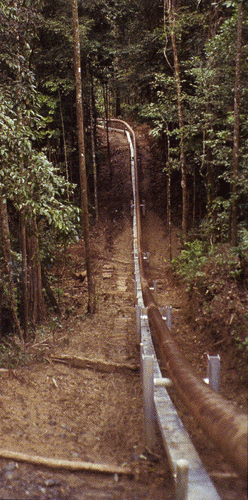Chevron shareholders should prepare for billions in environmental damages
Chevron shareholders may be liable for billions in environmental damages
Activist group says Texaco subsidiary damaged Ecuador rainforest
Amazon Watch release
April 25, 2007
 Between the 1967 and the 1990s, the Oriente rainforest of Ecuador suffered serious degradation and deforestation from Texaco’s oil extraction and production activities. Originally it appeared that Texaco (now Chevron) might pull out of the Oriente without reparations, but widespread protests by indigenous peoples, environmentalists, and human rights organizations forced Texaco into negotiations. Texaco projected its clean up costs at a moderate US$5-10 million. In response to the insufficient clean-up gesture, along with environmental degradation and serious health problems among local peoples, lead attorney Cristobal Bonifaz filed a US$1.5 billion class action lawsuit (Maria Aguinda, et al., v. Texaco Inc.) against Texaco in White Plains, NY on behalf of 30,000 indigenous peoples affected by the oil company’s operations. Other suits against Texaco in Ecuador had failed allegedly because of Texaco’s political influence with the Ecuadorean judiciary.
Savages, a book by Joe Kane, tells the story of the Huaorani, a tribe living in the deepest part of the Amazonian rain forest in Ecuador, and their struggles with Texaco. |
The lead lawyer in the landmark environmental lawsuit against Chevron in Ecuador is in California to warn that the oil major has failed to prepare for a possible multi-billion dollar damages bill within the coming months.
Speaking ahead of Chevron’s annual shareholder meeting on Wednesday, Pablo Fajardo, who represents 30,000 plaintiffs in the class-action lawsuit, stressed that a judgment was now likely in early 2008. “After years of litigating, it is fantastic news that the end of this court-case is now in sight,” said Mr. Fajardo, during his first visit to California, the home state of the San Ramon-based oil giant. “I don’t wish to prejudge the court’s decision but the scientific evidence against Chevron heard at trial has been overwhelming.”
Meanwhile, environmental group Amazon Watch warned that Chevron had broken SEC regulations by misrepresenting that evidence. Amazon Watch Executive Director Atossa Soltani said: “Chevron shareholders need to know that Chevron is now on the brink of being ordered to pay for an environmental remediation that has been provisionally costed at $6 billion.
“Mr. O’Reilly has failed in his fiduciary responsibilities and in his insistence on fighting a losing case tooth-and-nail. Every site inspected by the court that Texaco (now Chevron) operated in the Ecuadorian Amazon is polluted. Concentrations of toxic contaminants have been found to be hundreds and thousands of times higher than permitted by Ecuadorian law. Chevron’s legal defense doesn’t have a leg to stand on.”
During three decades of drilling for oil in an inhabited area of the Ecuadorian Amazon, Chevron allegedly dumped more than 18 billion gallons of toxic by-products from the drilling process directly into rivers and streams, on which local families depend. That waste contained 30 times more crude than the Exxon Valdez spill, prompting local communities, racked by cancers and other health problems, to sue Chevron in 2003. Now, after four years, the judge has rejected Chevron’s complaints and fast-tracked the David-and-Goliath trial to finish hearing evidence by the end of July. A judgment, which could see Chevron being ordered to pay one of the largest damage awards in civil history, is expected in early 2008.
Chevron’s handling of the case has landed the oil major in hot water in both Ecuador and the US. Here, the Securities and Exchange Commission (SEC) has been investigating Chevron over its failure to disclose details of the court-case in its 10k and other financial filings. Meanwhile, in Ecuador, Chevron is facing a potential criminal investigation resulting from a complaint by Luis Macas, a national indigenous leader and former presidential candidate.
Atossa Soltani, Amazon Watch Executive Director, said: “There is a huge question mark hanging over the head of Mr. O’Reilly. The strategy he spearheaded to deal with Chevron’s Ecuador disaster has been a moral, legal and corporate failure. Chevron management urgently need to devise a strategy to deal with the potential bill and the damage to the corporation’s reputation as a result of the mismanagement and misrepresentation around this lawsuit. That is the least shareholders should now expect.”
This is a modified news release from Amazon Watch